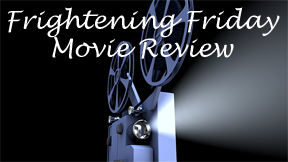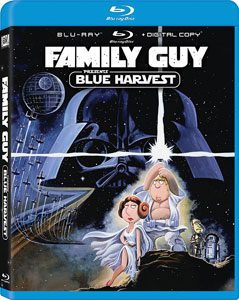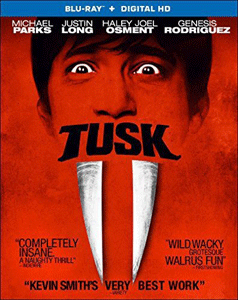Writer-director Kevin Smith is a funnyman and – as of 2011’s “Red State” – also a horror filmmaker. With 2014’s “Tusk” – the first of a loose True North trilogy that includes “Yoga Hosers” (2016) and a TBD capper – he combines those two passions.
“Tusk” has its genesis with Smith and SModcast co-host Scott Mosier making up a movie idea on a whim. As an audio clip over the closing credits shows, it’s a laughable lark to them. They essentially invent a tragic “Batman” villain, elevated to parodic extremes.
Long vs. Parks
“Tusk” is undeniably watchable on the first viewing (especially if you’re lucky enough to not know the twist), and it has plenty of positive points. (MILD SPOILERS FOLLOW.) It’s original compared to the mainstream horror films around it, an effectively gruesome and strange piece of body horror.

“Tusk” (2014)
Director: Kevin Smith
Writers: Kevin Smith, based on a podcast story by Smith and Scott Mosier
Stars: Justin Long, Michael Parks, Johnny Depp
“Tusk” features a strong performance by Justin Long as free-spirited, arrogant podcaster Wallace. Long is the likable Everyguy in “Jeepers Creepers” but he adds a dash of smarm in “Tusk,” “House of Darkness” and “Barbarian.”
Michael Parks (“Red State”) smoothly alternates between cultured and nutso as Howard Howe, who lives in a mansion near Bifrost, Manitoba. It’s “aboot” a two-hour drive, notes the Winnipeg gas station cashier played by Smith’s daughter Harley Quinn.
“Tusk” was shot in North Carolina, so it doesn’t achieve the snowy coldness it needs. But it doesn’t go far wrong by focusing on Long and Parks. Similar to “House of Darkness,” it’s sort of awkward and sort of fascinating as the two strangers chat in this remote house. Howe spins good yarns, and Wallace (seeking stories for his podcast) is professionally engaged. But menace hangs in the air via the firelit room and the score’s bass chords.
Once the twist comes, Long continues to do great work, and excellent practical effects sell the body horror.
Too slick for a B-movie?
On the negative side, we remain in the shallow end of the horror pool. We wear water-wings because “Tusk” is also a comedy (albeit sometimes an effectively pitch-black one).
Cutaways to Wallace’s girlfriend Genesis Rodriguez and bestie Haley Joel Osment are unfortunately basic. But the B-thread gains energy when an unrecognizable and uncredited Johnny Depp enters as Guy LaPointe, a quirky Quebec-based P.I. who is obsessed with catching the serial killer. One scene is a blast from a pure acting standpoint: a flashback to LaPointe encountering Howe, who acts like a simpleton.
“Tusk” reaches heights of dark comedy when a beautifully tragic song plays over the end credits. But there’s something off about “Tusk” in a way Smith probably didn’t intend. It’s horrific, but a little too silly. Then it’s silly, but a little too horrific. Its imagery is shocking, but the plot’s investigative procedure is straightforward.

It’s not a pure self-indulgent lark; it’s as professionally made as the slick “Red State.” But I get the sense that Smith was laughing while making it, as he is while dreaming up the idea with Mosier on the podcast.
“Tusk” perhaps turned out better as body horror than Smith expected when he dreamed up a goofy B-movie with Mosier. As such, the comedy undermines the horror. Still, if Smith can make something so perversely watchable off the cuff, you can’t deny his talent.

